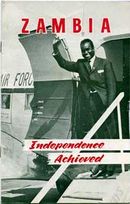History of Zambia (1964–present)
Zambia since 1964, despite its considerable mineral wealth, Zambia faced major challenges. Domestically, there were few trained and educated Zambians capable of running the government,[1] and the economy was largely dependent on foreign expertise. Most of Zambia's neighbouring countries were still colonies or under white minority rule.
The United National Independence Party (UNIP) won the pre-independence elections, gaining 55 of the 75 seats. The Zambian African National Congress won 10 seats, and the National Progressive Party won all the 10 seats reserved for whites.[2] Kenneth Kaunda was elected Prime Minister, and later the same year president, as the country adopted a presidential system. Kaunda adopted an ideology of African socialism, close to that of Julius Nyerere in Tanzania. Economical policies focused on central planning and nationalisation, and a system of one party rule was put in place.
Kaunda: 1964 - 1991
Chiluba: 1991- 2002
Mwanawasa: 2002-2008
Banda: 2008-2011
Sata: 2011-2014
Lungu: 2015-Present
References
<templatestyles src="Reflist/styles.css" />
